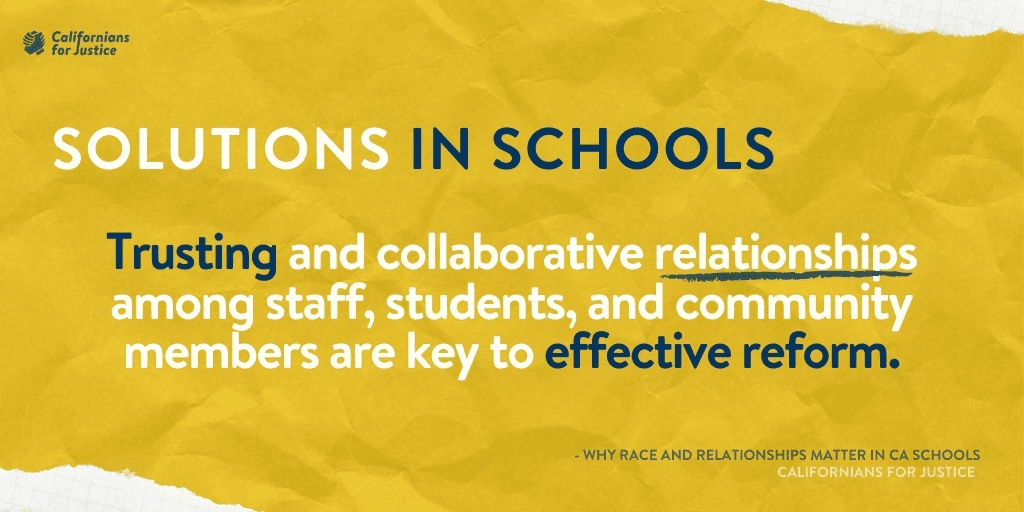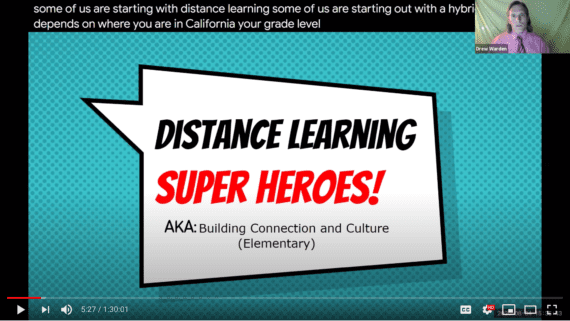
Safety and Support Are Key for Students’ Learning
Every student deserves a learning environment where they feel safe and supported. Relationships and connectedness are key factors in creating learning environments where all young people thrive, both personally and academically. However, studies show that students of color experience less support in school—reporting less favorable experiences of safety, connectedness, relationships with adults, and opportunities for participation—in comparison to their white peers. Fostering strong relationships built on trust and authenticity in our schools is a way everyone in a school can deepen racial equity.
Many young Californians experience traumas that affect their attention, learning, and behavior with teachers and peers. This was true before COVID-19, but has been exacerbated by the trauma of the pandemic and by the intensified focus on racial injustices. The good news is that research on human development shows that strong, trusting relationships can provide an antidote to students’ trauma.
To be fully supported and reach their potential, all students—especially students of color—need learning experiences that build trusting, meaningful, authentic relationships among students and adults and offer growth and healing, not punishment. Luckily, around California, schools and communities—led by students, families, and educators—are creating learning environments of belonging and inclusion. The California Partnership for the Future of Learning’s Shared Story Table is excited to highlight a few of these success stories and invites you to join us in uplifting these bright spots.
Center Trusting Relationships
Californians for Justice (CFJ)’s Relationship Centered Schools campaign aims to break down cycles of racial bias and education inequity by creating schools where educators and students build trusting relationships that empower all students to pursue their dreams. The campaign was inspired by student-led research, which found that one out of three students in California public schools couldn’t name a single caring adult at school. This lack of adult connections leads students to disengage from learning and fall short of reaching their full potential.
CFJ partners with school districts to build the systems and structures that support meaningful bonds between students and adults. Since COVID-19 has changed how students and teachers interact and created even more need for supportive relationships, CFJ held a virtual workshop last week about the importance of centering student voice and collecting racial equity data in order to navigate online and distance learning. Read more and access materials from the workshop >

Photo Credit: Parent Teacher Home Visit Project
Building Bridges Between Teachers and Families
Relationships formed between teachers and their students’ families are crucial to breaking down barriers of language, race, culture, and economic status. Parent Teacher Home Visits (PTHV) is a strategy for building trust and respect so teachers and families can partner to support student well-being and achievement.
Started in Sacramento more than 20 years ago through a partnership of Sacramento Area Congregations Together, Sacramento City Unified School District, and the Sacramento City Teachers Association, the model supports teachers meeting with parents and caregivers to learn more about their hopes for their child. Through the home visits, educators also learn about the history of racism and inequities experienced by their students/families of color, which can help them overcome their own implicit biases and better connect with, understand, and teach their students. As one PTHV trainer said, “Teachers visit neighborhoods they’ve never been to before and meet people from cultures they know little about. And that’s kind of the point.”
Due to the COVID-19 pandemic, teachers can no longer visit homes in person, but they are still building and strengthening those relationships. PTHV has shifted its work to offer training for virtual visits and other resources for educators and families to connect safely.

Photo Credit: California Teachers Association
Preparing Teachers to Foster Engagement & Equity Through Distance Learning
COVID-19 has hugely impacted all students as they cope with the trauma of the pandemic and its collateral consequences, including job losses, school closures, and uncertainty about the future. These traumas can affect students’ ability to engage in distance learning.
To help prepare educators to support the complex needs of students and create trusting relationships across distance, the California Teachers Association offered a Distance Learning Support Series, which included sessions on culture, engagement, and SEL and equity, access, agency, & advocacy. Topics covered included building connection and culture virtually, anti-racism and culturally relevant pedagogy, and supporting virtual English language learning. Check out the full series here >
Additional Resources
Webinar: CA PFL hosted a virtual learning opportunity, A Racially Just and Culturally Responsive Return to School in the Time of COVID-19. The event featured students, parents, teachers, organizers, and researchers from across California, who offered examples of promising and effective structures and practices to build relationships and community as students, families, and educators return to school this fall. Watch the recording | Read a summary doc
Trainings: We also hosted two trainings on Back-to-School: Impacting Your District’s Learning Continuity Plan geared towards organizers, staff, and member leaders. The trainings explored how communities can engage with the Learning Continuity Plans districts are required to develop. Plans must articulate how districts will roll out teaching and learning, social-emotional supports, and other services this school year. Watch the recording | View the slides | See a breakdown of C19-related dollars for districts
Blog: How can we use this crisis as an opportunity to transform schools into nurturing communities that are committed to equity, diversity, and antiracism? Read the blog >